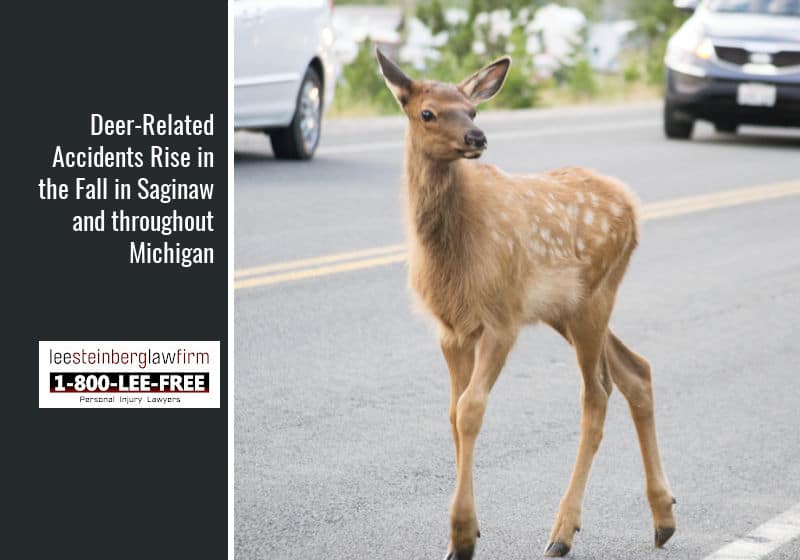
The deer population is on the rise in Saginaw and the rest of Michigan. Although deer are breathtaking to view in their natural habitat, they pose a high risk for drivers and passengers when they cross the road. Fall is an especially dangerous time for deer accidents because it’s their breeding season, and also hunting season. If you’re traveling through Saginaw or another part of Michigan, you need to be aware of how to avoid a deer-vehicle accident and what to do if you hit a deer.
Deer-Related Traffic Accidents in Michigan
Deer are a significant problem for motorists in Michigan. In 2019, there were 55,531 wrecks that involved deer. This was a significant increase from the previous year, which was around 53,000. Tragically, 12 people lost their lives because of deer-related wrecks in 2019, and 1,265 people were injured.
Traffic accidents involving deer commonly occur between the hours of 6:00 PM and 9:00 PM. Out of the 55,531 accidents that occurred in 2019, 13,702 occurred during these hours, six of which caused fatal injuries. Additionally, it’s important to note that there’s a significant increase in deer-related traffic accidents in the Fall. 43% of all deer-vehicle collisions occur between the months of October and December.
Avoiding Deer Collisions in Saginaw
Although deer-related car accidents are common and happen suddenly, there are steps you can take to stay safer while on the road.
- You should always avoid driving while distracted or while under the influence of drugs or alcohol.
- Always wear a seatbelt. An unbuckled driver or passenger can be ejected from the vehicle in the event of a animal collision.
- You need to stay especially careful during dawn and dusk when deer are most active.
- Be extra cautious when driving in Fall and Spring.
- If you see a deer, continue driving with extra caution. Deer often travel single file in packs, so multiple deer might cross the road.
- Stay alert for signage indicating a heavy deer population, and drive extra carefully when you see deer crossing signs.
- It’s a good idea to keep your brights on when there aren’t other cars around, but you should avoid flashing your brights or honking your horn at crossing deer.
What Should You Do If You Wreck into a Deer in Saginaw?
If a wreck is unavoidable, you need to brace yourself and take precautions to mitigate potential injuries and property damage. You should avoid swerving at all costs because you could cause a more serious wreck. Also, you should avoid slamming on your brakes if the wreck is inevitable. When you slam on your brakes, you position the nose of your car downward, which can result in the deer crashing through your windshield. If you maintain your position, the deer is more likely to roll off of your vehicle. You should also make sure to keep your steering wheel steady during impact.
After experiencing a deer-vehicle collision, you need to take immediate action for medical and insurance purposes. Take the following steps in the event of a deer-related crash:
- If anyone is hurt, call an ambulance immediately.
- Regardless of whether or not an injury occurred, you should contact the police.
- Pull over your vehicle and turn on your hazards while you wait for the police or an ambulance.
- Don’t approach the deer if it’s still alive. Injured deer can be highly dangerous.
- Take pictures of the damages your vehicle sustained as well as any injuries.
- If there were witnesses to the incident, collect their testimonies and save their contact information.
Contact Saginaw, MI Car Accident and Personal Injury Attorneys
If you were injured in a deer-related car accident, contact a personal injury and car accident lawyer for your insurance claims. Auto accident and personal injury attorneys can help you receive the compensation you deserve from insurance companies in the event of a deer-related traffic accident. Lee Steinberg Law Firm specializes in personal injuries sustained during vehicular accidents, and we can help you get the money you deserve from insurance companies. Contact our deer-vehicle collision attorneys at 1-800-LEE-FREE (1-800-533-3733) or click here for a free case evaluation.

